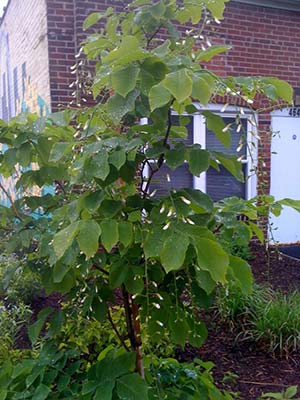Helping city trees grow larger and live longer is the purpose behind structural soil. Large, healthy trees provide shade and habitat for beneficial wildlife plus make neighborhoods more beautiful. They also reduce storm water runoff and energy bills. Cornell University Structural Soil consists of a specific ratio of load-bearing stones and nutrient rich soil that provides stability for paved surfaces above and space for roots to grow below.
Trees intercept storm water with their leaves, branches and bark. The bigger the tree, the more storm water it can intercept. A tree’s root system also absorbs water plus trees help reduce erosion by slowing rain down before it hits the ground.
 Brightside is using structural soil underneath the public sidewalk along Shenandoah to allow tree roots to reach additional open ground without causing the concrete to heave or become damaged. The additional growing space and decreased sidewalk maintenance will allow our black gum trees to grow bigger and healthier and live longer. If given the chance to grow to 18” in diameter, our black gum trees will capture 3,142 gallons of storm water each year compared to only 976 gallons for an 8” diameter tree. Learn more about the benefits of trees in your yard.
Brightside is using structural soil underneath the public sidewalk along Shenandoah to allow tree roots to reach additional open ground without causing the concrete to heave or become damaged. The additional growing space and decreased sidewalk maintenance will allow our black gum trees to grow bigger and healthier and live longer. If given the chance to grow to 18” in diameter, our black gum trees will capture 3,142 gallons of storm water each year compared to only 976 gallons for an 8” diameter tree. Learn more about the benefits of trees in your yard.
Brightside is also using structural soil under the stamped concrete sidewalk to help the yellowwood tree in the Butterfly garden live and thrive for many years.
Use This at Home
Some homeowners may wish to put structural soil underneath a driveway, patio or private walkway to enable trees to grow larger to provide shade and manage storm water without buckling pavement.
Municipalities and commercial developments could also benefit from incorporating structural soil into their developments and construction projects. By using structural soil, cities can extend the life of street trees and protect the tree roots from damaging sidewalks. Parking lots with trees planted in small islands provide little shade if the trees only live for a few years. Structural soil can provide the rooting space these trees need to grow larger and provide needed shade in parking lots and along streets to reduce the urban heat island effect.
SEE IT AT THE DEMO GARDENResources
Learn more about Cornell University Structural Soil.
East-West Gateway Council of Governments explores St. Louis rainscaping projects